JUNK SCIENCE
Roundup® Litigation
 St. Louis, along with fellow Judicial Hellhole® California, is home to tens of thousands of lawsuits against Monsanto involving its Roundup® weedkiller. These lawsuits allege that the active ingredient in the product, glyphosate, causes non-Hodgkin lymphoma.
St. Louis, along with fellow Judicial Hellhole® California, is home to tens of thousands of lawsuits against Monsanto involving its Roundup® weedkiller. These lawsuits allege that the active ingredient in the product, glyphosate, causes non-Hodgkin lymphoma.
Despite the Missouri legislature requiring closer scrutiny of proposed expert testimony in 2017 by adopting a standard consistent with federal courts and most other state courts, St. Louis judges have allowed junk science in their courtrooms. Because of this, law firms across the country are flocking to St. Louis to file their lawsuits.
Monsanto has successfully defended itself in most cases heard in the venue; however, the judges continue to stack the deck against them.
In May 2023, Monsanto secured another victory, even after the plaintiff’s counsel put forward two questionable “experts” who argued glyphosate caused the plaintiff to develop non-Hodgkin lymphoma more than ten years after she had used the product. Dr. Beate Ritz, an epidemiologist from UCLA, is known for testifying in previous trials against Monsanto that glyphosate in Roundup® causes this form of cancer.
Her opinions have previously been called into question as junk science by Judge Vince Chhabria of the U.S. District Court for the Northern District of California. In a 2018 Roundup® trial, Dr. Ritz was questioned on the ground that she did not adjust her analysis to account for exposure to other pesticides or other factors that might cause cancer, despite her own testimony that it would be wise to consider such data, or “adjusted odd ratios.” Other epidemiologists also testified the same.
Dr. Ritz also was called out for “cherry-picking” results by downplaying other studies showing that the link between glyphosate and non-Hodgkin lymphoma is insignificant and Judge Chabbria called her conclusion that glyphosate causes cancer “dubious.”
A second St. Louis expert, Dr. Dennis Weisenburger, claimed that the plaintiff’s use of Roundup® from 1992 to 2005 was a significant factor in her non-Hodgkin lymphoma diagnosis, but discounted other health risk factors. Dr. Weisenburger has served as expert on behalf of plaintiff in previous Roundup® lawsuits and has said that using Roundup® for more than 2 days in a year doubles the risk of developing non-Hodgkin lymphoma. When questioned on cross examination about the fact that no regulatory body aside from the International Agency for Research on Cancer (IARC) has classified glyphosate as carcinogenic, he could not give a direct answer.
For St. Louis to move off the Judicial Hellholes® list, judges must embrace their role as gatekeepers at the outset of trial and not allow junk science to be heard in their courtrooms.
Case to Watch: Allegrezza et al. v. Monsanto Co.
 In yet another Roundup® trial held in St. Louis County in September 2023 over allegations that the weedkiller caused a plaintiff’s cancer, the plaintiff’s expert exposed her unshakable bias during cross-examination. The plaintiff had retained Dr. Kristan Aronson, a recently retired epidemiologist and cancer causation researcher, to express an opinion that glyphosate causes non-Hodgkin lymphoma.
In yet another Roundup® trial held in St. Louis County in September 2023 over allegations that the weedkiller caused a plaintiff’s cancer, the plaintiff’s expert exposed her unshakable bias during cross-examination. The plaintiff had retained Dr. Kristan Aronson, a recently retired epidemiologist and cancer causation researcher, to express an opinion that glyphosate causes non-Hodgkin lymphoma.
During her testimony, Aronson plunged into research dating back to 2015, coinciding with the year when IARC published its monograph that classified glyphosate as a probable human carcinogen. Upon closer scrutiny by Monsanto’s lawyers, it emerged that Aronson had only inspected and formed an opinion on this research nearly six years later, when the plaintiff’s legal team approached her in the fall of 2021. Essentially, the plaintiff’s lawyers colored their expert’s testimony by supplying the motive for Aronson to turn to their favorite research.
Shortly after this damaging revelation, the plaintiff’s lawyers rested their case. The next day, Judge Brian May granted a directed verdict to Monsanto, representing Monsanto’s ninth Roundup® trial win in a row. The plaintiff’s team expressed their intent to appeal the ruling.
 Judges in St. Louis seem to have embraced their reputation for skirting both state law and U.S. Supreme Court precedent. They have allowed junk science to enter their courtrooms, going so far as to allow expert witnesses to testify who other courts have found unreliable. Nuclear verdicts are becoming more frequent. Not only are plaintiffs from other states flocking to the jurisdiction, but international parties are coming to St. Louis courts as well.
Judges in St. Louis seem to have embraced their reputation for skirting both state law and U.S. Supreme Court precedent. They have allowed junk science to enter their courtrooms, going so far as to allow expert witnesses to testify who other courts have found unreliable. Nuclear verdicts are becoming more frequent. Not only are plaintiffs from other states flocking to the jurisdiction, but international parties are coming to St. Louis courts as well.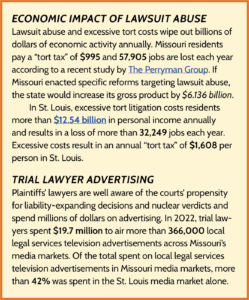 Much-needed civil justice reform legislation has stalled in Missouri for the past few years, and the legislature must prioritize reforms to address the lawsuit abuse bogging down business in the state.
Much-needed civil justice reform legislation has stalled in Missouri for the past few years, and the legislature must prioritize reforms to address the lawsuit abuse bogging down business in the state.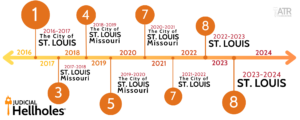



 St. Louis, along with fellow Judicial Hellhole® California, is home to tens of thousands of lawsuits against Monsanto involving its Roundup® weedkiller. These lawsuits allege that the active ingredient in the product, glyphosate, causes non-Hodgkin lymphoma.
St. Louis, along with fellow Judicial Hellhole® California, is home to tens of thousands of lawsuits against Monsanto involving its Roundup® weedkiller. These lawsuits allege that the active ingredient in the product, glyphosate, causes non-Hodgkin lymphoma. In yet
In yet  St. Louis remains a preferred jurisdiction for the plaintiffs’ bar. As of July 2023, St. Louis had seen a
St. Louis remains a preferred jurisdiction for the plaintiffs’ bar. As of July 2023, St. Louis had seen a 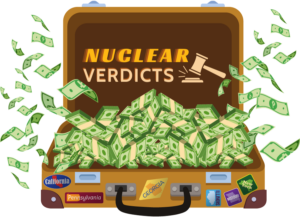 According to a
According to a 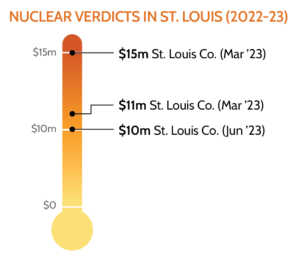 March 2023:
March 2023:  In 2017, the Missouri Legislature passed
In 2017, the Missouri Legislature passed  In April, the U.S. Court of Appeals for the Eighth Circuit
In April, the U.S. Court of Appeals for the Eighth Circuit 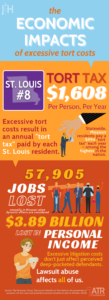 Much-needed reforms continue to stall in the Missouri legislature as several legislators have accepted campaign contributions from the trial bar and are now doing its bidding.
Much-needed reforms continue to stall in the Missouri legislature as several legislators have accepted campaign contributions from the trial bar and are now doing its bidding.

